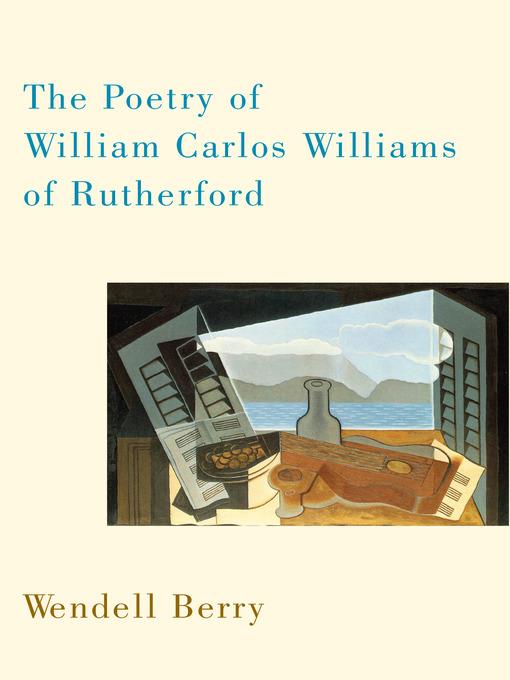
The Poetry of William Carlos Williams of Rutherford
کتاب های مرتبط
- اطلاعات
- نقد و بررسی
- دیدگاه کاربران
نقد و بررسی

February 15, 2011
Award-winning poet, essayist, and novelist Berry (Hannah Coulter) here pays homage to another great American writer, one who was an early influence on Berry's work. William Carlos Williams (1883-1963) is best known for his five-volume epic poem Paterson and for hybrid poetry-prose works such as Spring and All (1923). The phrase "of Rutherford" in the title reflects that both Berry and Williams are deeply grounded in a particular geographic location. For Berry, Rutherford is a touchstone for Williams's work. Engaging in cogent literary criticism, Berry considers typical poetic elements such as syntax, measure, and rhythm in Williams's work. He also goes beyond this approach as he casts a poet's eye on themes such as the relationship between poet and place (the means by which Williams influenced Berry), the intersection of nature and art, and artistic innovation. Williams's argument with T.S. Eliot over the future of poetry is also illuminated. VERDICT Berry's work will be of most interest to students and researchers in American modernist poetry, while practicing writers and poets may appreciate his insights into the creative process. Berry's large following may want to consider it as well.--Alison M. Lewis, Drexel Univ., Philadelphia
Copyright 2011 Library Journal, LLC Used with permission.

November 15, 2010
A personal and critical homage to a giant of American poetry.
William Carlos Williams (1883-1963), one of America's most respected 20th-century writers, is the author of numerous books of poetry, fiction, essay, drama and autobiography, including Spring and All (1923), Life Along the Passaic River (1938), and The Farmers' Daughters (1961). He is recognized as one of the central figures in postwar American poetry and is often associated with Modernism and, somewhat erroneously, Imagism. The prolific Berry (Imagination in Place, 2010, etc.) also works in multiple genres, and he is perhaps as well-known for poetry and fiction as for essays on a wide range of topics, including farming and agriculture, ecological awareness, rural American culture, poetics and imagination and politics. With a sensibility that is decidedly pastoral, agrarian, even populist, it is not surprising that Berry reads Williams via a poetics of place, or what he calls "local adaptation." This is a fairly conventional reading that contrasts Williams--the "true" regional poet of rural America--with the supposedly more urban, cosmopolitan and international avant-garde writers like T.S. Eliot and Ezra Pound. Although Berry acknowledges Williams' complexity and antipoetic tendencies, as well as his similarities to Eliot, he always returns him to a fundamentally lyrical poetics interested in the "mass of detail" and an attempt to find beauty and order in nature via poetry. This interpretation is somewhat pedestrian and situates Williams as a poet on a romantic quest for some kind of unmediated contact with nature and the objects of reality. The importance of Williams's phrase "no ideas but in things" has been persistently exaggerated by critics, and Berry uses it as a kind of springboard to argue that Williams' poetry is "culturally useful." Finally, the author's attacks on writers and critics teaching in universities--"literary industrialists"--seem misplaced.
Of interest to poetry neophytes and newcomers to Williams' work, less so to seasoned readers.
(COPYRIGHT (2010) KIRKUS REVIEWS/NIELSEN BUSINESS MEDIA, INC. ALL RIGHTS RESERVED.)

January 1, 2011
It isnt surprising that farmer-poet Berry reports ever-increasing affinity with physician-poet Williams, the single first-generation American modernist who took his home ground and people as his prime subject and audience respectively and, so doing, spoke to the world. He is indisputably Berrys great model, though Berry is a rural, Williams an urban, poet, as Berry verifies in his thorough discussion of Williams poetic practice. Williams formulated his own poetics in his poetry, and through his conceptions of the imagination and its work (which Berry saliently compares to Coleridges much more famous ones), he honored the great modernist injunction to make it new; that is, Berry understands Williams to be saying, to participate in the original work of creation. Generously quoting many of Williams best lines, tenderly confessing when he doesnt understand Williams (e.g., Williams elusive variable foot), and referring to his own life and work to clarify what he thinks about Williams, Berry produces a work of aesthetics more than evaluation, of love more than critique.(Reprinted with permission of Booklist, copyright 2011, American Library Association.)

























دیدگاه کاربران